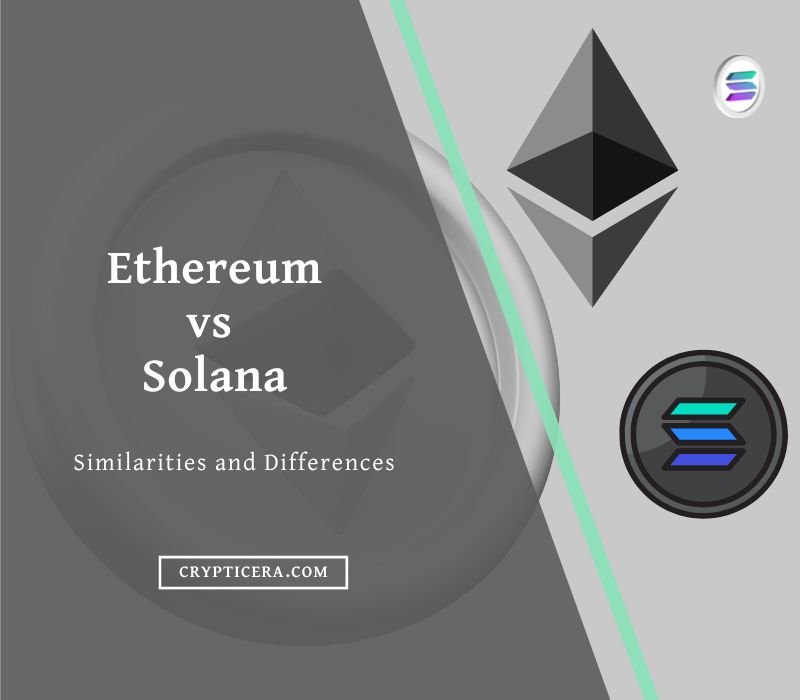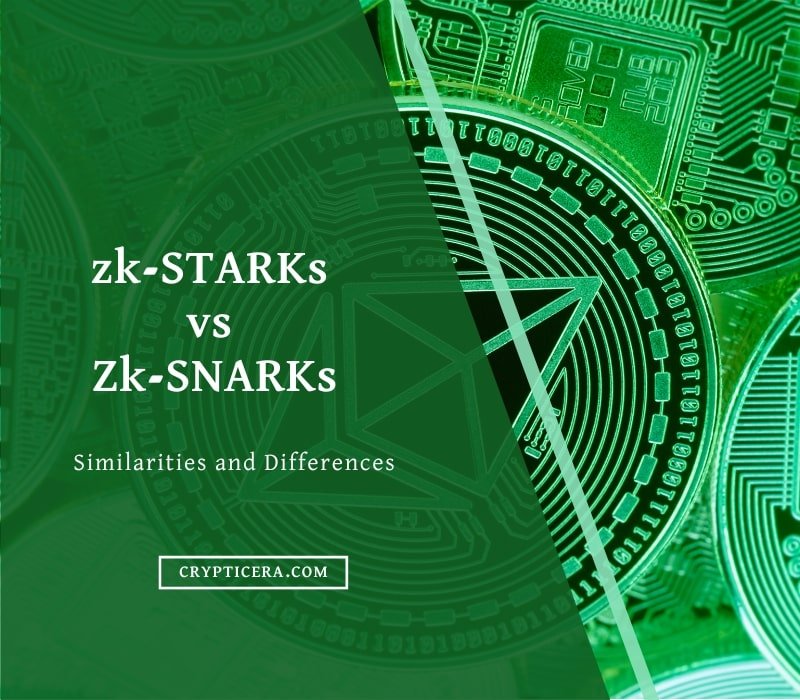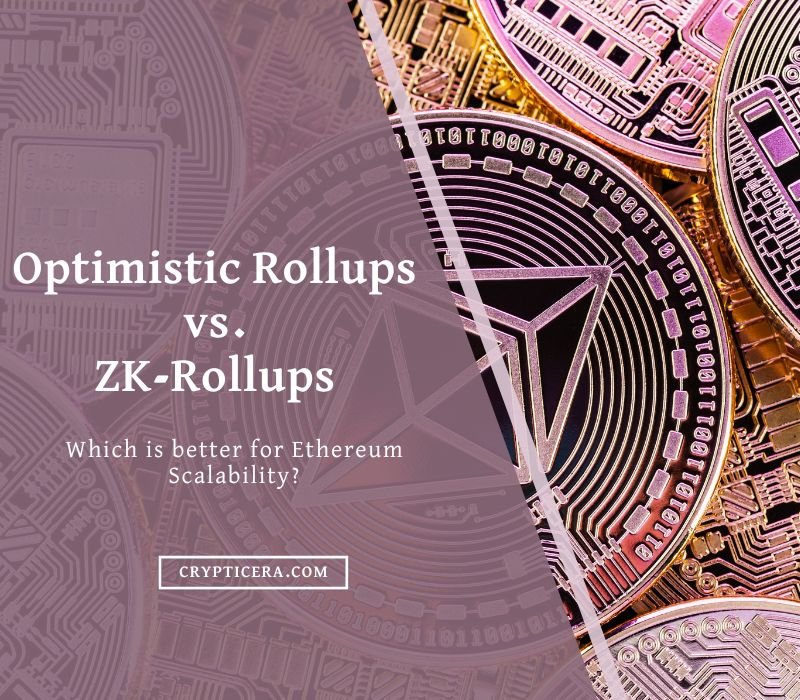If you’re considering using a software wallet, you may have come across two popular options: Atomic Wallet and Exodus. But which one is the best choice for you?
Atomic Wallet is a multi-cryptocurrency desktop wallet that supports over 500 assets, while Exodus Wallet is a desktop and mobile wallet suitable for Ethereum (ERC-20) network cryptocurrencies.
In this blog post, we’ll dive deep into the features, user experience, and security of both “Atomic Wallet vs Exodus” to help you make an informed decision.
So, let’s get started!
Key Takeaways:
- Atomic Wallet is a multi-cryptocurrency wallet that allows users to securely store, manage, and exchange a variety of digital assets.
- Exodus is a popular Ethereum blockchain desktop-based crypto wallet known for its user-friendly interface and built-in exchange feature.
- Both Atomic Wallet and Exodus offer strong security features and support for a wide range of cryptocurrencies, but Atomic Wallet offers more advanced features such as atomic swaps and a built-in decentralized exchange.
We Recommend: Best Software Wallets
Choose Security over Convenience

Best 3FA Non-custodial wallet
- No seed phrase vulnerability, powered by MPC
- A guaranteed wallet recovery model
- Built-in
Web3 firewall

Best Custodial wallet (100% Solvent)
- 800+ coins and tokens
- Copy trading and bots
- Automatic Trading Strategies
- Staking APY up to 130%
Atomic Wallet vs Exodus: Key Differences
| Feature | Atomic Wallet | Exodus Wallet |
|---|---|---|
| Launched date | 2017 | 2015 |
| Founders | Konstantin Gladych | JP Richardson and Daniel Castagnoli |
| User Ratings | 4.5/5 | 4.2/5 |
| No. of assets supported | Over 500+ | Over 260+ |
| Staking | Yes (up to 11% APY) | Yes (up to 19.5% APY) |
| NFT Storage | Only Store | Buy, sell, and store |
| Security | Cold storage and 2FA | Cold storage (Trezor partnership) and 2FA |
| Non-custodial | Yes | Yes |
| 12-word seed phrase | Yes | Yes |
| In-built exchange | Available | Available |
| No. of blockchains supported | 20+ | 100+ |
| Transaction fees | 0.55 -2% ($10 minimum) | Customizable fees structure |
| User friendly | Yes | Yes |
Atomic Wallet Overview
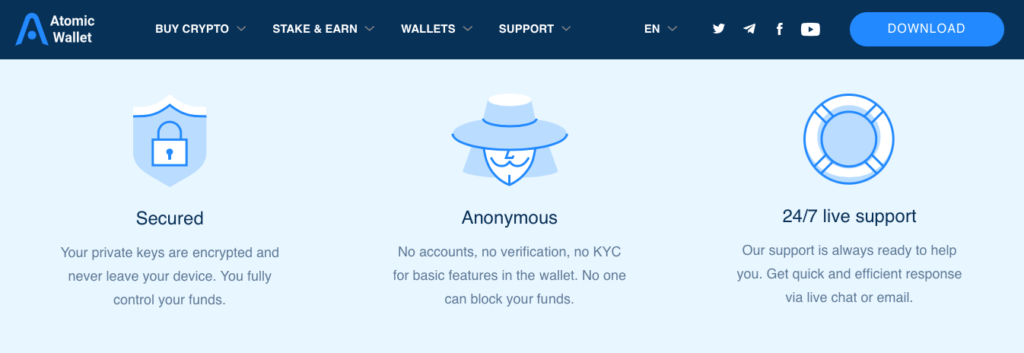
Atomic Wallet is a multi-cryptocurrency desktop wallet that allows you to manage and store over 500 different cryptocurrencies. It provides a high level of security through encrypted private keys and built-in atomic swaps.
Atomic Wallet also supports decentralized exchanges and allows users to buy crypto with a credit card.
The wallet has a user-friendly interface and is available for download on Windows, macOS, and Linux operating systems. It also offers a mobile app for iOS and Android devices.
Read: Atomic Wallet Review
Exodus Wallet Overview
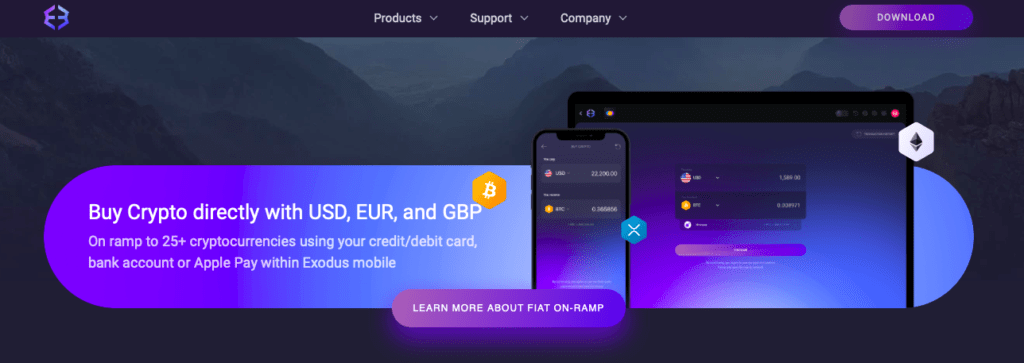
Exodus is a software-based cryptocurrency wallet. The wallet is designed to be easy to use, even for people who are new to cryptocurrency.
It also has several built-in tools and features that can help you manage your assets, such as the ability to track your portfolio, exchange cryptocurrencies within the wallet, and set up price alerts.
Exodus is also known for its security features. It uses advanced encryption techniques to protect your private keys and your funds, and it also has several backup and recovery options to help you keep your assets safe.
Read: Exodus Wallet Review
Atomic Wallet vs Exodus: The Ultimate Comparison
When it comes to managing your cryptocurrency assets, both Exodus and Atomic Wallet offer users a similar level of control and autonomy.
These decentralized, non-custodial wallets allow individuals to hold their own backup phrases and private keys, taking responsibility for their own security.
However, there are some subtle differences that may make one option a better fit for you.
For example, Exodus has recently implemented a new address format that incorporates Segregated Witness technology.
This allows for faster and cheaper transactions on the network, making it a more efficient choice for those looking to minimize fees and wait times.
Additionally, many experts believe that Exodus offers superior security measures compared to Atomic Wallet.
Here is a more detailed comparison between “Atomic Wallet vs Exodus” based on the following key points-
Working and Features
Atomic Wallet and Exodus are cryptocurrency wallets that give users complete control over their assets.
Both are decentralized, non-custodial wallets, which means that users own their backup phrases and private keys and are responsible for managing their security.
The wallets store private keys and backup phrases locally on the user’s device and encrypt them for added security.
Funds are not stored in the wallets themselves, but rather on the blockchain, where they are kept safe.
Atomic Wallet and Exodus connect directly to blockchain nodes and allow users to view their balances, transaction history, and other information, as well as make transactions on the blockchain.
In addition, the wallets also offer exchange and buying services through their partners.
Staking & Earn
Atomic wallet offers staking for over 10 assets, supports over 30 blockchains, and allows users to easily manage a wide variety of tokens within the app.
You can stake Cosmos (ATOM) for 10% APY, Hedera (HBAR) for 6.55 APY, Algorand (ALGO) for 0.63% APY, Near Protocol (NEAR) for 11% APY, etc.
The Exodus wallet allows users to stake seven different cryptocurrencies, but the specific rules and systems for staking may vary depending on the PoS blockchain of the particular asset.
It supports Solana (SOL) for 7.5% APY, Cosmos (ATOM) for 19.25% APY, Cardano (ADA) for 4.9%, etc.
NFT Storage

With Atomic Wallet, you can easily keep all of your crypto NFTs and game assets organized and secure in one central location.
It should be noted that Atomic wallet only supports storing NFTs. You can not buy/sell NFTs using the wallet.
The NFT Gallery on Exodus Web3 Wallet supports NFTs on Ethereum, Solana, and other supported networks. You can store, manage, buy, and sell your NFTs using the Exodus wallet.
All you need is to connect your Web 3 wallet to NFT Marketplaces Like Opensea, rarible, etc.
Fees
Purchasing and exchanging cryptocurrencies on Atomic Wallet comes with certain fees. When using a bank card for fiat-to-crypto transactions, a 2% fee ($10 minimum) is applied by Atomic Wallet.
It is important to note that your card issuer may also charge a fee. In addition, a 0.5% fee is imposed by Atomic Wallet on exchanges, in addition to any commission fees charged by its exchange partner.
The use of Exodus is free of charge, but there are fees associated with conducting transactions on various blockchain networks.
It uses the Ethereum blockchain mainly which is a high gas fees network. You can also customize transaction fees.
These fees can fluctuate depending on the level of activity on the network at any given moment.
During periods of high demand, fees may be higher. It is important to note that Exodus does not profit from these fees.
No.of Supported Assets
The Atomic Wallet supports over 500 different cryptocurrencies, including popular options like Bitcoin, Ethereum, USD Coin, and Cardano, as well as many smaller tokens.
Exodus is a digital wallet that allows users to manage and exchange various cryptocurrencies, including popular options like Bitcoin, Ethereum, and Litecoin.
In total, the platform supports more than 260 different types of digital coins and is constantly working to add new ones. Some of the other currencies available on Exodus include Dogecoin, Tether, and Shiba Inu.
Whether you’re looking to buy, sell, or trade your favorite digital assets, Exodus makes it easy to do so in a secure and user-friendly way.
Payment Methods and Fiat Currencies
Both Atomic Wallet and Exodus support multiple payment methods, including credit/debit cards, bank transfers, and cryptocurrencies.
However, Atomic Wallet also allows users to buy cryptocurrencies directly within the wallet using a credit/debit card, while Exodus does not.
Both allow users to exchange a limited number of fiat currencies, such as USD, EUR, and GBP. Atomic Wallet, on the other hand, does not currently support the holding of fiat currencies within the wallet.
User Experience
Both Atomic Wallet and Exodus have user-friendly interfaces that are easy to navigate.
However, Exodus has a more polished and visually pleasing interface, while Atomic Wallet’s interface is more functional and straightforward.
Both provide customer support through a variety of channels such as email, social media, 24/7 chat, and an online knowledge base FAQs.
Exodus has an extensive online knowledge base and a larger community forum, which can be useful for self-help and troubleshooting.
Best Alternatives of Atomic Wallet or Exodus wallet
SAFEPAL S1
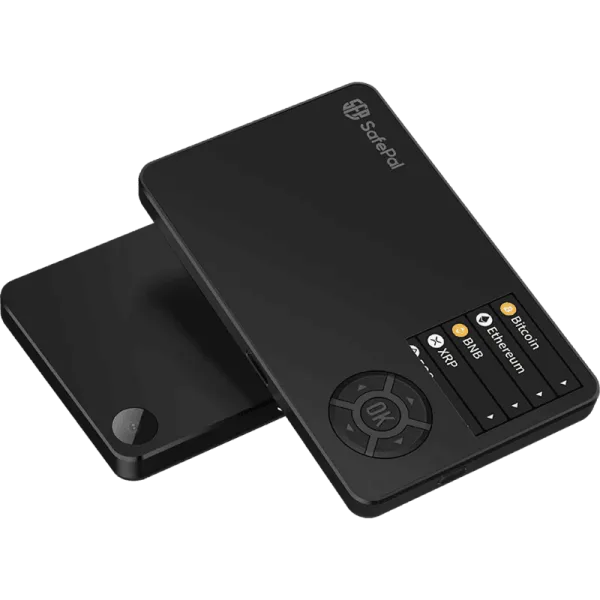
- QR Code Transaction Signing
- Portable and Affordable
- No Bluetooth, No NFC, No Wifi, highly secure
- Unlimited Tokens on 54+ blockchains
ELLIPAL Titan
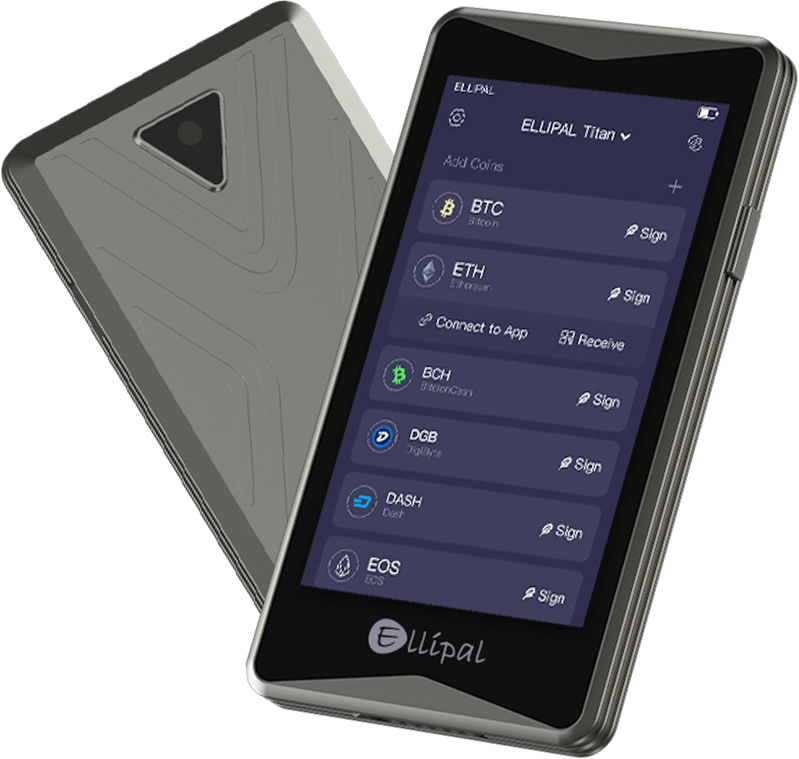
- 100% air-gapped cold wallet
- Easy Portable with a screen size of Just 4 inch
- Camera for QR Code scanning
- Supports 10,000+ crypto coins and 51 blockchains
Atomic Wallet vs Exodus: Hardware Wallet Compatibility
Atomic Wallet supports hardware wallet integration with Trezor, Ledger, and KeepKey devices, which allows users to manage their cryptocurrency assets securely offline.
Atomic Wallet also allows users to use their hardware wallets with the Atomic Wallet app on their desktops.
Exodus, on the other hand, supports integration with hardware wallets like Trezor and Ledger.
Pros and Cons of Using Atomic Wallet
Pros
- Supports over 500 cryptocurrencies
- User-friendly interface with easy-to-use features
- Offers built-in exchanges for easy trading
- Provides private key stored on the user’s device for enhanced security
- Allows staking and earning rewards for certain cryptocurrencies
Cons
- Limited customer support options
- May experience occasional bugs and glitches
- Some users report slow transaction processing times
- Not open source, so the code cannot be independently verified
Pros and cons of Exodus Wallet
Pros
- User-friendly interface for beginners.
- Supports a wide range of cryptocurrencies.
- Provides easy backup and recovery options.
- Offers in-app exchange options.
- Strong security features like password protection and two-factor authentication.
- Hardware wallet Support
Cons
- Closed-source software with limited transparency.
- Limited customer support.
- Higher fees compared to other wallet options.
- Trust Wallet Vs Exodus
- 7 Best Custodial Crypto Wallets
- Coinomi Vs Atomic Wallet
- Trust Wallet Vs Coinbase Wallet
- 11 Best Cardano Wallets
- 7 Best Bitcoin Hardware Wallets
Methodology: How to decide on the best wallet?
When comparing Exodus and Atomic wallet, consider the following factors:
1️⃣ Security: Both wallets have strong security measures, but make sure to compare their encryption, password strength requirements, and 2FA options.
2️⃣ Supported Coins: Check which cryptocurrencies are supported by each wallet, as well as their respective exchange rates and transaction fees.
3️⃣ User Interface: Consider which wallet has a more user-friendly interface and easy navigation.
4️⃣ Features: Compare the features of each wallet, such as built-in exchange, staking, and portfolio tracking.
5️⃣ Customer Support: Make sure to research the customer support options for each wallet, including response time and availability.
By considering these factors, you can make an informed decision on which wallet is the best fit for your needs.
Is Atomic Wallet and Exodus safe to Use?
Atomic Wallet and Exodus are secure and convenient ways to access your cryptocurrency assets on the blockchain.
With Atomic Wallet and Exodus, your private keys and backup phrase are stored locally on your device and are protected with strong encryption.
This means that you are the only one who has access to your keys and funds, as Atomic Wallet does not store any of your private data.
To keep your wallet safe, it’s important to follow some basic safety guidelines: keep your device secure, never share your backup or private keys with anyone, and use a unique and strong password for your Wallet and store it in a trusted password manager.
By following these simple rules, you can ensure that your wallet and your funds are safe and secure.
How to buy Crypto Using Atomic Wallet or Exodus wallet?
To buy cryptocurrency using Atomic Wallet or Exodus Wallet, you will need to follow these steps:
- Download and install the Atomic Wallet or Exodus Wallet on your device.
- Open the wallet and create a new account. Follow the instructions on the screen to set up your account.
- Once your account is set up, click on the “Exchange” or “Buy” tab to access the in-wallet exchange.
- Select the cryptocurrency that you want to buy and the payment method that you want to use. You can use a credit card, debit card, or bank transfer to purchase cryptocurrency.
- Enter the amount of cryptocurrency that you want to buy and review the details of your transaction.
- If everything looks correct, confirm the transaction and wait for the purchase to be completed.
Custodial vs Non-Custodial Cryptocurrency Wallets
| Custodial Wallet | Non-Custodial Wallet | |
|---|---|---|
| Definition | A wallet where the private keys are stored by a third party | A wallet where the user holds the private keys |
| Control of private keys | 3rd person | User |
| Security | Higher security risk due to the centralization of private keys | Lower security risk due to the decentralization of private keys |
| Convenience | Easy to use and set up | More complex to set up and use |
| Responsibility for losses | Losses may be covered by the third party | Losses are the responsibility of the user |
| Compatibility with different devices | Private keys may not be accessible from all devices | Private keys can be accessed from any device with the correct authentication |
Conclusion
In conclusion of “Atomic wallet vs Exodus”, offer a range of features and a user-friendly interface that make them popular choices for cryptocurrency software wallets.
While they both offer a high level of security, Atomic Wallet stands out for its advanced features, such as the ability to buy and exchange cryptocurrencies directly within the wallet and its support for a wide range of digital assets.
However, Exodus is a strong choice for those who are looking for a simple and easy-to-use wallet that is specifically designed for use with a desktop computer.
Ultimately, the best choice for you will depend on your specific needs and preferences. We hope that this comparison has helped you make an informed decision about which software wallet is the best fit for you.
Related FAQs
What is Crypto Digital Wallet?
A cryptocurrency wallet is a digital wallet that allows you to store, send, and receive cryptocurrencies like Bitcoin, Ethereum, and more. It is a software program that holds the private and public keys that are necessary for conducting transactions with cryptocurrencies.
Cryptocurrency wallets can be divided into two main categories: hot wallets and cold wallets. Hot wallets are connected to the internet and are therefore more vulnerable to hacking and other security threats.
Cold wallets, on the other hand, are not connected to the internet and are considered to be more secure. Cold wallets can be further divided into hardware wallets and paper wallets.
Hardware wallets are physical devices that store your private keys in a secure offline environment. They are considered to be the most secure type of cryptocurrency wallet, as they are not vulnerable to hacking or other online threats.
Paper wallets are pieces of paper that contain your private keys and other information necessary to access your cryptocurrency. They are also considered to be very secure, as long as they are properly stored and not lost or damaged.
What is a 12-word backup Key?
A 12-word backup key, also known as a recovery phrase or seed phrase, is a series of words that are used to restore access to a cryptocurrency wallet.
It is typically a string of 12 to 24 words that are generated when you create a new wallet. The words are chosen randomly from a pre-determined list, and the order in which they are presented is also random.
It allows you to recover access to your wallet if you lose your password or if your device is damaged or stolen. To use the backup key, you will need to enter the words in the correct order to restore access to your wallet.
It’s important to keep your 12-word backup key in a safe and secure place because anyone who has access to it will be able to gain access to your wallet.
Some people choose to write the words down on a piece of paper and store it in a secure location, while others use Hardware backups Like Cryptotag zeus etc.
Software vs Hardware wallet: Which is Best?
A software wallet is a program that is installed on a computer or mobile device. It allows the user to store, send, and receive cryptocurrency.
A hardware wallet is a physical device that stores the user’s private keys and allows the user to securely store and manage their cryptocurrency.
Hardware wallets offer a higher level of security than software wallets because the private keys are stored on the device and are not connected to the internet. This makes it much more difficult for hackers to access the keys and steal the user’s cryptocurrency.
However, hardware wallets can be lost or damaged, so it is important to keep them in a safe place and have a backup in case of an emergency.
Software wallets are generally easier to use and more convenient, as they can be accessed from any device with an internet connection. However, they are more vulnerable to attacks because they are connected to the internet and the private keys are stored on the device.
It is important to use a secure password and to keep the software wallet software up to date with the latest security patches.
Are Atomic Wallet and Exodus Software or Hardware wallets?
Exodus and Atomic Wallet are both software wallets. A software wallet is a type of cryptocurrency wallet that stores the private keys for your cryptocurrency in a digital format on your computer, phone, or another device.
